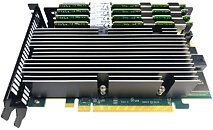Magewell Expands Eco Capture Family of Ultra-Compact, Power-Efficient M.2 Capture Cards
Magewell has unveiled a new model in its Eco Capture family of ultra-compact, power-efficient, M.2 video capture cards. The new single-channel Eco Capture AIO M.2 provides both HDMI and SDI interfaces with embedded audio support for flexible input connectivity. Magewell will highlight the Eco Capture AIO M.2 and other new innovations in booth C5031 at the 2023 NAB Show in Las Vegas from April 16 to 19.
Magewell's Eco Capture cards offer systems integrators and OEM developers a high-performance video capture solution with low power consumption in a space-efficient form factor. The cost-effective, low-latency devices feature a high-speed PCIe 2.0 bus interface with an M.2 connector and measure just 22x80mm (0.87x3.15 in), making them ideal for incorporation into small, portable or embedded systems where full-sized PCIe slots are not available.
Magewell's Eco Capture cards offer systems integrators and OEM developers a high-performance video capture solution with low power consumption in a space-efficient form factor. The cost-effective, low-latency devices feature a high-speed PCIe 2.0 bus interface with an M.2 connector and measure just 22x80mm (0.87x3.15 in), making them ideal for incorporation into small, portable or embedded systems where full-sized PCIe slots are not available.





































